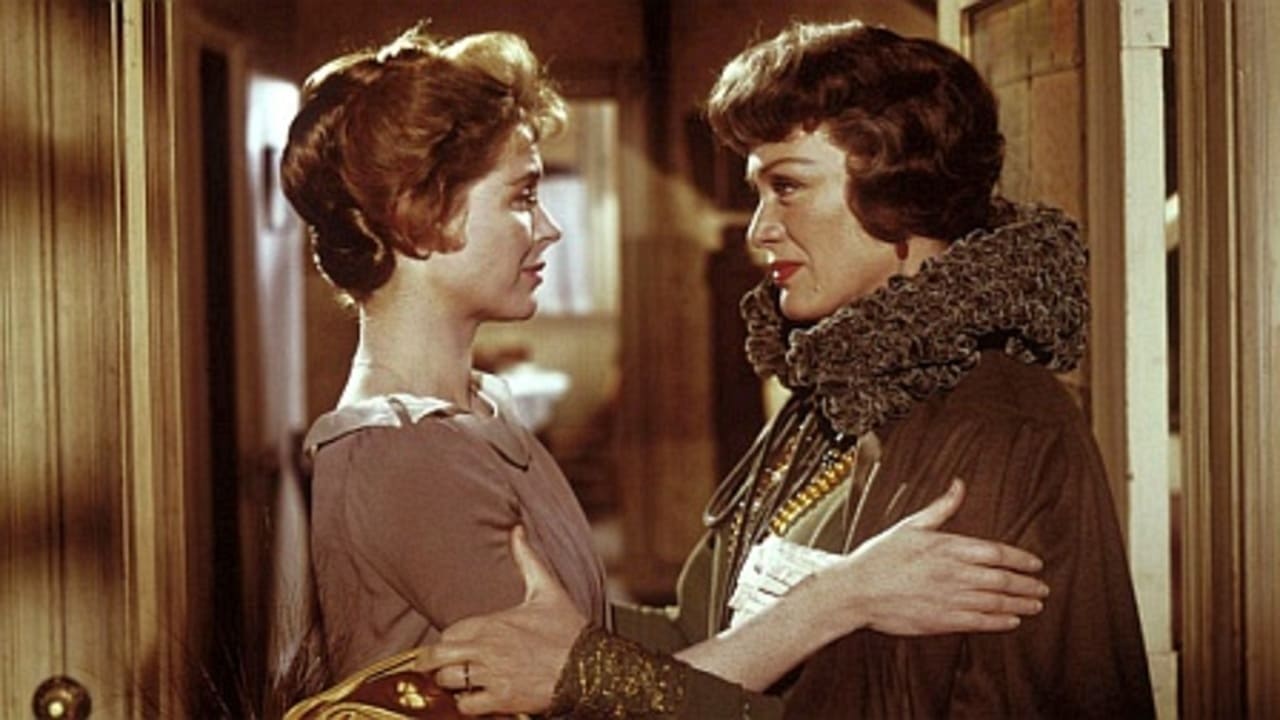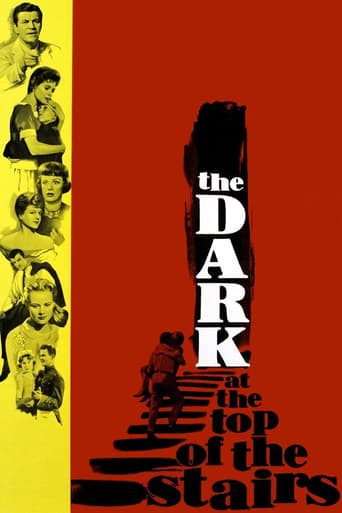Matialth
Good concept, poorly executed.
Kidskycom
It's funny watching the elements come together in this complicated scam. On one hand, the set-up isn't quite as complex as it seems, but there's an easy sense of fun in every exchange.
Teddie Blake
The movie turns out to be a little better than the average. Starting from a romantic formula often seen in the cinema, it ends in the most predictable (and somewhat bland) way.
Cody
One of the best movies of the year! Incredible from the beginning to the end.
moonspinner55
Intelligent and observant drama of small town lives in the 1920s. Robert Preston is a Midwestern family man and traveling salesman who loses his job, fights with his wife (who accuses him of infidelity), and walks out of the house all on the same day. The screenwriters, Harriet Frank Jr. and Irving Ravetch, adapting the celebrated play by William Inge, allow for smart, pungent, often amusing interplay between husband and wife, the couple and their in-laws, mother and son, and father and daughter. There's also a beautifully modulated sequence between Preston and Angela Lansbury, playing the local beautician who wouldn't mind dallying with a married man--though this one sees her as just a friend. The picture runs too long, and features too much of budding teenager Shirley Knight and her blind date (the atrociously mannered Lee Kinsolving). Preston, too, is often overstated in his approach to the central role, while spouse Dorothy McGuire has to contend with unflattering costumes and the proverbial wifely hang-ups (she's frigid in the bedroom, she treats her husband like another child, etc.). The film has that phony Warner Bros. backlot appearance that dogged so many of their period films for decades, and a few of the speeches are underlined with a high-toned literacy that doesn't have the ring of natural conversation. Delbert Mann's direction is uneven and the camera-work is barely adequate, however this character piece has interesting people, engaging grown-up talk and some surprising candor and wit. **1/2 from ****
jpdoherty
Based on the Purlitzer Prize-winning play by William Inge Warner Bros. THE DARK AT THE TOP OF THE STAIRS (1960) was adapted for the screen by Harriet Frank Jnr. and Irving Ravetch. Produced for the studio by Michael Garrison it turned out to be a fairly engaging and entertaining melodrama thanks in no small measure to the well rounded direction by Delbert Mann and solid performances by a committed cast. Although unavoidably static, because of its theatrical origins, it nevertheless was nicely photographed in Technicolor by the great Harry Stradling and gorgeously scored by the studio's legendary Max Steiner.Set in a small town in 20's Oklahoma the story concerns the ups and downs of the Flood family. An average family trying to get on with their everyday lives. The head of the household is patriarch Rubin (Robert Preston) who because of the changing times suddenly loses his job as a saddlery salesman and keeps it a secret from his devoted but angst-ridden wife Cora (Dorothy McGuire). Cora is also mother to their shy and withdrawn teenage daughter (Shirley Knight) and their equally withdrawn adolescent son who is constantly afraid of the dark at the top of the stairs.Wonderfully acted throughout Preston gives a flamboyant portrayal of the irascible but well meaning Rubin and McGuire was never better as the ever worried and brow beaten Cora. Her performance is sensitive and heartfelt. Also fine is Shirley Knight in her Oscar nominated role as the young girl who's heart is broken much too early in life when she falls for the ill-fated Jewish boy Sammy Golden (Lee Kinsolving). But stealing the show is the entrance of Eve Arden as Cora's droll sister Lottie who arrives on a visit with her hen-pecked husband Morris (Frank Overton). "I just can't stand the sound of her voice" he confides in Rubin.Complimenting the whole production is the lovely music by Max Steiner. Full of exquisite themes this is one of the composer's most captivating scores. The main theme, first heard under the titles, is a beguiling waltz. Rubin's theme is a jaunty march-like piece while the theme for Cora is bluesy and reflective. But the highlight of the score is the ingenious little theme he wrote for the teenage lovers. Scored for Harmonica and strings it gives their scenes together a gentle and persuasive charm. The piece became somewhat popular in the early sixties when a cover version was recorded by the Percy Faith Orchestra. Evidently trying for another hit with a Steiner tune after that orchestra's runaway smash with the composer's "Theme From A Summer Place" the year before.THE DARK AT THE TOP OF THE STAIRS has never been released on DVD or VHS for that matter. Perhaps this accounts for it being without a reputation. Pity it's not better known but when it is seen the movie stands up well and all because of its fine production values, its memorable performances, its adroit direction and all wrapped up neatly in a gorgeous and unforgettable musical score.
bbboomer49-1
I saw this movie years ago and fell in love with it. I have hunted for the video but unfortunately there isn't one. I was lucky enough to find it playing on TV several years ago and taped it. Although I am happy to have what I do, I think it's a shame it is not available for the Robert Preston fans out there. It is a movie that was before its time. It hit on topics that were seldom talked about publicly in the time setting. Topics hinted at but not openly discussed like they do in this film. Robert Preston did a remarkable job as the character, Rubin Flood. Your heart went out to him because you could see through his strong, always looking for the positive, family provider roll. The fear and uncertainty he faced each day as the head of his family and his aging prospects at being successful in the eyes of his family. The film has a glorious mix of humor and drama. Unforgettable!!
Joseph Harder
Robert Preston will be forever remembered as "The Music Man"-and well he should be. However, he gave many other fine performances, and one of the best was as Rubin Flood in The Dark at the Top of the Stairs.Dwight McDonald once wrote an essay mocking "Ingeland and Kazanistan", and he may have had a point. At the same time, the series of films based on William Inges plays includes some of the best dramas of the fifties and early sixties..still, perhaps the most underrated period of Amnerican film.This film is not just an example of sentimental "americana". Though set in the past, it is not an exercise in simplistic nostalgia. Instead it reveals the sexual repression, Anti-Semitism,and snobbery which poisoned American life in the early part of this century.However, it does not simply look at the past from a standpoint of smug superiority. Instead, it suggests the dignity and inner strength of these people, as they struggled with economic and moral uncertainty.It has a superficially "happy' ending', yet it is still a sad and troubling portrait of the fragility of quotidian existence.

